高三英语重点句型总结
高三英语复习:英语必备经典句型
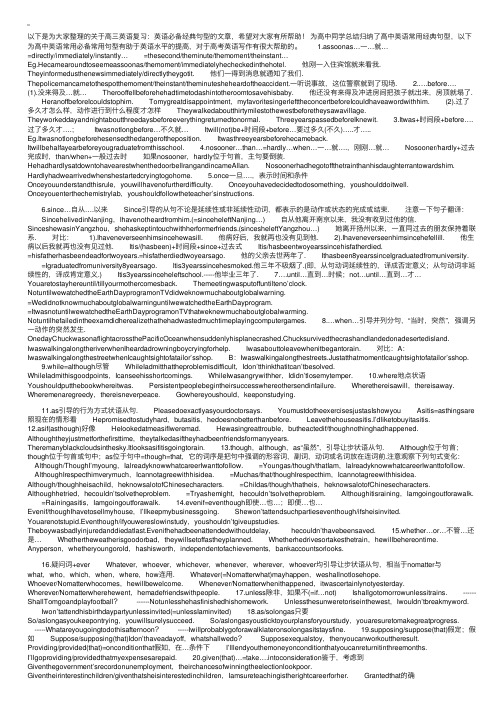
以下是为⼤家整理的关于⾼三英语复习:英语必备经典句型的⽂章,希望对⼤家有所帮助!为⾼中同学总结归纳了⾼中英语常⽤经典句型,以下为⾼中英语常⽤必备常⽤句型有助于英语⽔平的提⾼,对于⾼考英语写作有很⼤帮助的。
1.assoonas…⼀…就…=directly/immediately/instantly… =thesecond/theminute/themoment/theinstant… Eg.Hecamearoundtoseemeassoonas/themoment/immediatelyhecheckedinthehotel. 他刚⼀⼊住宾馆就来看我. Theyinformedusthenewsimmediately/directlytheygotit. 他们⼀得到消息就通知了我们. Thepolicemancametothespotthemoment/theinstant/theminutesheheardoftheaccident.⼀听说事故,这位警察就到了现场. 2.….before…. (1).没来得及…就… Therooffellbeforehehadtimetodashintotheroomtosavehisbaby. 他还没有来得及冲进房间把孩⼦就出来,房顶就塌了. HeranoffbeforeIcouldstophim. Tomygreatdisappointment,myfavoritesingerlefttheconcertbeforeIcouldhaveawordwithhim. (2).过了多久才怎么样,动作进⾏到什么程度才怎样 Theywalkedaboutthirtymilestothewestbeforetheysawavillage. Theyworkeddayandnightaboutthreedaysbeforeeverythingreturnedtonormal. ThreeyearspassedbeforeIknewit. 3.Itwas+时间段+before….过了多久才….; Itwasnotlongbefore…不久就… Itwill(not)be+时间段+before…要过多久(不久)…..才….. Eg.Itwasnotlongbeforehesensedthedangeroftheposition. Itwasthreeyearsbeforehecameback. Itwillbehalfayearbeforeyougraduatefromthisschool. 4.nosooner…than…=hardly…when…⼀…就….,刚刚…就… Nosooner/hardly+过去完成时,than/when+⼀般过去时 如果nosooner,hardly位于句⾸,主句要倒装. HehadhardlysatdowntohavearestwhenthedoorbellrangandincameAllan. Nosoonerhadhegotoffthetrainthanhisdaughterrantowardshim. Hardlyhadwearrivedwhenshestartedcryingtogohome. 5.once⼀旦….,表⽰时间和条件 Onceyouunderstandthisrule,youwillhavenofurtherdifficulty. Onceyouhavedecidedtodosomething,youshoulddoitwell. Onceyouenterthechemistrylab,youshouldfollowtheteacher’sinstructions. 6.since…⾃从….以来 Since引导的从句不论是延续性或⾮延续性动词,都表⽰的是动作或状态的完成或结束. 注意⼀下句⼦翻译: SincehelivedinNanjing,Ihavenotheardfromhim.(=sinceheleftNanjing…) ⾃从他离开南京以来,我没有收到过他的信. SinceshewasinYangzhou,shehaskeptintouchwithherformerfriends.(sincesheleftYangzhou…) 她离开扬州以来,⼀直同过去的朋友保持着联系. 对⽐: 1).Ihaveneverseenhimsincehewasill. 他病好后,我就再也没有见到他. 2).Ihaveneverseenhimsincehefellill. 他⽣病以后我就再也没有见过他. Itis/(hasbeen)+时间段+since+过去式 Itis/hasbeentwoyearssincehisfatherdied. =hisfatherhasbeendeadfortwoyears.=hisfatherdiedtwoyearsago. 他的⽗亲去世两年了. Ithasbeen8yearssinceIgraduatedfromuniversity. =Igraduatedfromuniversity8yearsago. Itis3yearssincehesmoked.他三年不吸烟了.(即,从句动词延续性的,译成否定意义;从句动词⾮延续性的,译成肯定意义.) Itis3yearssinceheleftschool.-----他毕业三年了. 7….until…直到…时候;not…until…直到…才… Youaretostayhereuntil/tillyourmothercomesback. Themeetingwasputoffuntilteno’clock. NotuntilwewatchedtheEarthDayprogramonTVdidweknowmuchaboutglobalwarning. =WedidnotknowmuchaboutglobalwarninguntilwewatchedtheEarthDayprogram. =ItwasnotuntilwewatchedtheEarthDayprogramonTVthatweknewmuchaboutglobalwarming. Notuntilhefailedintheexamdidherealizethathehadwastedmuchtimeplayingcomputergames. 8.…when…引导并列分句,“当时,突然”,强调另⼀动作的突然发⽣. OnedayChuckwasonaflightacrossthePacificOceanwhensuddenlyhisplanecrashed.Chucksurvivedthecrashandlandedonadesertedisland. IwaswalkingalongtheriverwhenIheardadrowningboycryingforhelp. Iwasabouttoleavewhenitbegantorain. 对⽐:A:IwaswalkingalongthestreetwhenIcaughtsightofatailor’sshop. B:Iwaswalkingalongthestreets.JustatthatmomentIcaughtsightofatailor’sshop. 9.while=although尽管 WhileIadmitthattheproblemisdifficult,Idon’tthinkthatitcan’tbesolved. WhileIadmithisgoodpoints,Icanseehisshortcomings. WhileIwasangrywithher,Ididn’tlosemytemper. 10.where地点状语 Youshouldputthebookwhereitwas. Persistentpeoplebegintheirsuccesswhereothersendinfailure. Wherethereisawill,thereisaway. Wheremenaregreedy,thereisneverpeace. Gowhereyoushould,keeponstudying. 11.as引导的⾏为⽅式状语从句. Pleasedoexactlyasyourdoctorsays. YoumustdotheexercisesjustasIshowyou Asitis=asthingsare 照现在的情形看 Hepromisedtostudyhard,butasitis,hedoesnobetterthanbefore. Leavethehouseasitis.I’dliketobuyitasitis. 12.asif(asthough)好像 HelookedatmeasifIweremad. Hewasingreattrouble,butheactedif/thoughnothinghadhappened. Althoughtheyjustmetforthefirsttime,theytalkedasiftheyhadbeenfriendsformanyyears. Theremanyblackcloudsinthesky.Itlooksasifitisgoingtorain. 13.though,although,as“虽然”,引导让步状语从句. Although位于句⾸;though位于句⾸或句中;as位于句中=though=that,它的词序是把句中强调的形容词,副词,动词或名词放在连词前.注意观察下列句式变化: Although/ThoughI’myoung,IalreadyknowwhatcareerIwanttofollow. =Youngas/though/thatIam,IalreadyknowwhatcareerIwanttofollow. AlthoughIrespecthimverymuch,Icannotagreewithhisidea. =Muchas/that/thoughIrespecthim,Icannotagreewithhisidea. Although/thoughheisachild,heknowsalotofChinesecharacters. =Childas/though/thatheis,heknowsalotofChinesecharacters. Althoughhetried,hecouldn’tsolvetheproblem. =Tryashemight,hecouldn’tsolvetheproblem. Althoughitisraining,Iamgoingoutforawalk. =Rainingasitis,Iamgoingoutforawalk. 14.evenif=eventhough即使…也…;即便…也… Evenif/thoughIhavetosellmyhouse,I’llkeepmybusinessgoing. Shewon’tattendsuchpartieseventhough/ifsheisinvited. Youarenotstupid.Eventhough/ifyouwereslowinstudy,youshouldn’tgiveupstudies. Theboywasbadlyinjuredanddiedatlast.Evenifhehadbeenattendedwithoutdelay, hecouldn’thavebeensaved. 15.whether…or…不管…还是… Whethertheweatherisgoodorbad,theywillsetoffastheyplanned. Whetherhedrivesortakesthetrain,hewillbehereontime. Anyperson,whetheryoungorold,hashisworth,independentofachievements,bankaccountsorlooks. 16.疑问词+ever Whatever,whoever,whichever,whenever,wherever,whoever均引导让步状语从句,相当于nomatter与what,who,which,when,where,how连⽤. Whatever(=Nomatterwhat)mayhappen,weshallnotlosehope. Whoever/Nomatterwhocomes,hewillbewelcome. Whenever/Nomatterwhenithappened,itwascertainlynotyesterday. Wherever/Nomatterwherehewent,hemadefriendswithpeople. 17.unless除⾮,如果不(=if…not) Ishallgotomorrowunlessitrains. ------ShallTomgoandplayfootball? ------Notunlesshehasfinishedhishomework. Unlessthesunweretoriseinthewest,Iwouldn’tbreakmyword. Iwon’tattendhisbirthdaypartyunlessinvited(=unlessIaminvited) 18.as/solongas只要 So/aslongasyoukeepontrying,youwillsurelysucceed. So/aslongasyousticktoyourplansforyourstudy,youaresuretomakegreatprogress. -----Whatareyougoingtodothisafternoon? -----Iwillprobablygoforawalklateronsolongasitstaysfine. 19.supposing/suppose(that)假定;假如 Suppose/supposing(that)Idon’thaveadayoff,whatshallwedo? Supposexequalstoy,thenyoucanworkouttheresult. Providing/provided(that)=onconditionthat假如,在…条件下 I’lllendyouthemoneyonconditionthatyoucanreturnitinthreemonths. I’llgoproviding/providedthatmyexpensesarepaid. 20.given(that)…=take….intoconsideration鉴于,考虑到 Giventhegovernment’srecordonunemployment,theirchancesofwinningtheelectionlookpoor. Giventheirinterestinchildren/giventhatsheisinterestedinchildren,Iamsureteachingistherightcareerforher. Grantedthat的确 Grantedthatit’sasplendidcar,buthaveyouseenwhatitcosts? 21.incasethat…万⼀;以防;incaseof+n万⼀ Incase(that)Johncomes/shouldcome,pleasetellhimtowait. (incasethat后谓语⽤⼀般现在时或should+动词原型) PleaseremindmeaboutitincaseIforget/shouldforget. Pleasetakemyumbrellaincase(that)itrains/shouldrain. Incaseoffire,whatshouldwedo? 22.祈使句(表条件)+orelse/or/otherwise+主句(表结果)….否则…,要不然…. Pleasecallmeupbeforeyoucome,otherwise/orelse/orwemightbeout. Hurryup,oryouwillbelate. 祈使句(表条件)+and+主句(表结果) Givehimaninchandhewilltakeamile. Beunitedandcooperatewitheachotherandonlyinthiswaycanwesaveourearth. 23.as(so)…as…和…⼀样 HenryisasgoodaplayerasPeter(is). Heworkedasfastasaskilledworker(did). Wewillgiveyouasmuchhelpaswecan. 24.形容词/副词⽐较级+than 注意:形容词和副词的⽐较级前还可以加⼀个表⽰程度的修饰语,常⽤的修饰语是: (1).alittle,abit,slightly稍微;⼀些 (2).Much,alot,greatly,agreatdeal,far,byfar….得多 (3).Still,even,rather更 (4).Any⼀般⽤于疑问句,表⽰‘⼀些”;“稍微” (5).倍数或数量词. Thistextisalittle(abit)moredifficultthantheother. Hehasmadefargreaterprogressthistermthanhedidlastterm. Withthedevelopmentofsociety,peopleinChinaareagooddealricherthanbefore. Heistwoyearsolderthan=heisolderthanIbytwoyears. AsiaisthreetimeslargerthanEurope. =AsiaisthreetimesaslargeasEurope. =AsiaisthreetimesthesizeofEurope. 还应注意,当more作为many,much的⽐较级时,其修饰语分别是 (1).many,afew,+more+可数名词复数 (2)much,alittle,abit,agreatdeal+more+不可数名词 (3).alot,some,far,any+more+可数或不可数均可,more译作“另外” I’vemadealot(many)moremistakesthanyou’ve Hehasbuiltupalargebusinessandearnedmuchmoremoneythanbefore. 25.byfar最….;⽐….得多 注意:byfar既可修饰⽐较级⼜可修饰级,注意byfar在句中的位置. Heworkedharderbyfarthanhiselderbrother. Heisbyfarthetallerofthetwobasketballplayers. Heisbyfarthetallestofalltheplayersontheteam. Hisexplanationisbyfarclearerthantheoldone. 26.the+⽐较级….,the+⽐较级……越…,越….. Themoreyouneed,thebetteryouunderstand. Thehigherupyougo,thecolderitbecomes. Abodyweighslessthefurtheritgetsfromthesurfaceoftheearth. =Thefurtheritgetsfromthesurfaceoftheearth,thelessthebodyweights. Thesooner,thebetter. 27.no+⽐较级+than表⽰“A和B都不……” Not+⽐较级+than表⽰“A不如B……” Thisbookisnomoreinterestingthanthatone. HeworksnoharderthanI.他和我都不⽤功. Hedoesn’tworkharderthanI.他不如我⽤功 Morethan不仅仅nomorethan只不过,仅仅notmorethan=atmost不多于 Therearenomorethantenstudentsintheclassroom. Therearenotmorethantenstudentsintheclassroom. Heisnomorethanachild,soIdon’ttakehimtooseriously. Inourstudents’eyes,heismorethanateacher,heismorelikeourfriend. More+adj/n+than+adj/n与其说……倒不如说…… Heismoreofastudentthanofateacher.与其说他是个⽼师,倒不如说他是个学⽣. Heismorediligentthanclever.与其说他聪明,倒不如说他勤奋. 28.superior较⾼的,上好的,出众的,⾼傲的 Senior年长的,资格较⽼的,地位较⾼的,⾼级的 Junior年少的,下级的,和to搭配 Thiswesternrestaurantissuperiortotheonewewenttolastweek. Heisthreeyearsjuniortome=Heisjuniortomethreeyears. Sheisseniortoeveryoneelseinthecompany. 29.so+adj/adv+that;such(a/an)+adj+that“如此…..以⾄于…..”引导结果状语从句. HisEnglishwassolimitedthathecouldn’tunderstandwhatthenativespeakerssaid. Hewassodevotedtohisstudentsthatheoftenfellillfromoverworking. Itwassuchwarmweatherthatwewentswimming. Tabletennisissuchapopulargamethatpeopleallovertheworldplayit. 还应注意: (1)当名词前有many/much/few/little修饰时, ⽤so+n=that结构.即somany/much/few/little+n+that… Thereweresomanypeopleinthestreetwatchingthefirethatfirefighterscouldn’tgetclosetothebuilding. TheWesternerseatsomuchfatandsugarthattheyputonweighteasily. Thecountryhassolittlecoalthatithastoimportlargequantitiesofcoal. Therearesofewfishinthepoolthatwecan’tfishthemeasily. (2)such+a/an+adj.+n+that=so+adj.+a/an+n+that Heissuchanhonestpersonthatyoucandependonhimwhenyou’reintrouble. Heissohonestapersonthatyoucandependonhimwhenyou’reintrouble. (3)由so…that和such…that引导的结果状语从句的倒装结构.当so和其后的形容词或副词;such连词后的名词放在句⾸时,主句使⽤倒装结构 Suchgreatprogresshashemadeinhisstudiesthatwealladmirehim. (4)such…that句型的特殊性:such后可以不出现adj和n,也可以倒装. Hisbehaviorwassuchthatallhisfriendsdesertedhim. =Suchwashisbehaviorthatallhisfriendsdesertedhim. Theforceoftheexplosionwassuchthatallthewindowswerebroken. =Suchwastheforceoftheexplosionthatallthewindowswerebroken. 30.inorderthat;sothat(为了….)引导⽬的状语从句 Hegotupearlyinorderthat/sothathecouldcatchthefirstbus. Heclosedallthewindowswhiledrivingsothatheshouldn’tcatchcold. (sothat否定句要⽤shouldn’t) Sothat引导结果状语从句 对⽐:(1).hesetoffearly,sothathecaughtthefirstbus. (2).hesetoffearlysothathecouldcatchthefirstbus. 31.soasto/inorderto/to为了.作⽬的状语 Hewenthometoseehismother. Heshoutedandwavedsoastobenoticed. Johnhurriedsoasnottobelatefortheparty. Modernequipmentisfittedinourclassroomforallthestudentstostudywell. Theletterwasreadoutforallinthecourttohear. 注意:todo/inordertodo可放在句⾸,soasto不可 (1)._____lateinthemorning,Bobturnedoffthealarm. A.HavingsleptB.TosleepC.SleepingD.Sleep (2).-------Dad,Whydoyoubuysomanytapesformetolistento? -----______yourlistening. A.ImproveB.ImprovingC.HavingimprovedD.Toimprove (3).Dowhateveryoucould_____him. A.helpB.tohelpC.helpingD.helping 注意:只有不定式todo/inordertodo/soastodo可以作⽬的状语 Onlytodo表⽰未曾料到的愉快或不愉快的结果: Shewokeearlyonlytofinditwasraining. Hegothomeonlytolearnthathisfatherwasill. Hegottothestationonlytofindthetrainhadgone. “Liftingarockonlytodropitonone’sfeet”isaChinesefolksaying. ShehurriedbackonlytofindheroldfriendGeorgewaitingforhim. 对⽐: 现在分词表⽰主句动作所造成的结果: Hewascaughtintherain,thuscatchingcold. Theircarwascaughtinthetrafficjam,thuscausingthedelay. Todo作结果状语:(表⽰不愉快或意外结果) Hemustbedeafnottohearthat.他聋得听不见. Shewentabroadnevertoreturn.她出国了,结果再也没回来. 32.so+adj/adv+asto如此…以⾄于…作结果状语: Wouldyoubesokindastolendmeyourbicycle? Hewassofoolishastobelievesuchaman. Such…..asto如此…以⾄于…作结果状语: Don’tbesoupset,myillnessisnotsuchastocauseanxiety. Heissuchafoolastothinkthatheissomebodyandinfluenceothers. 他愚蠢地认为他是个了不起的⼤⼈物,可以影响其他⼈. 33.….enoughto….作结果状语,“⾜够…可以…” Heisoldenoughtogotoschool. Toourgreatsurprise,childasheis,heisboldenoughtorobpassers-by. Weareoldenoughtomakeagreatdifferencetotheworld. Thechampionranwellenoughtosetupanotherworldrecordindeedifshehadtriedharder. 她的确跑得相当快,不过要是她再努⼒⼀些,作为冠军就会再次创造⼀个世界记录. 34.too…to作结果状语,“太….⽽不能” Inmyopinion,theproblemwithmoststudentsliesinthefactthattheyaretooshytospeakEnglishinpublic. Wearenevertoooldtolearn. Heistooclevernottoreadourtricks.他⾮常聪明完全可以识破我们的诡计. 35.can’t/cannever和too,toomuch,enough,over搭配表⽰“⽆论怎样……都不过分” Whileyouaredoingyourhomework,youcan’tbecarefulenough. Heissuchagreatmanthatwecan’tpraisehimtoomuch. ThedevelopmentofsocietyhasmadeitnecessaryforustohaveagoodknowledgeofEnglish,sowecan’toveremphasizetheimportanceoflearningEnglish. Sinceit’sagoodthing,wecan’tdoittoosoon.。
高三英语语法知识点总结五篇
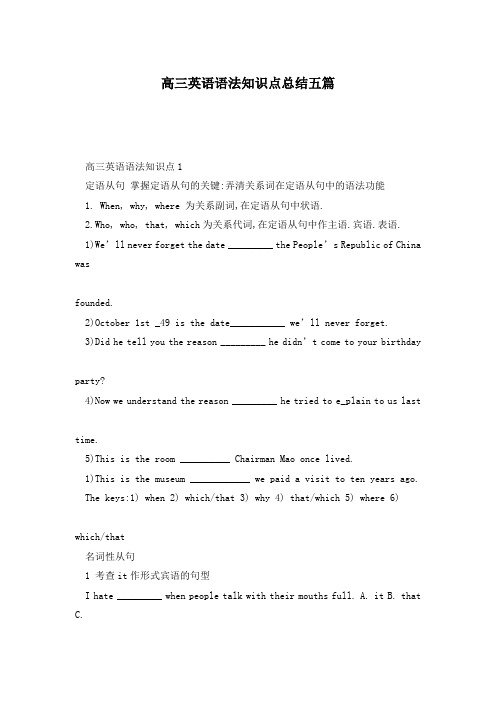
高三英语语法知识点总结五篇高三英语语法知识点1定语从句掌握定语从句的关键:弄清关系词在定语从句中的语法功能1. When, why, where 为关系副词,在定语从句中状语.2.Who, who, that, which为关系代词,在定语从句中作主语.宾语.表语.1)We’ll never forget the date _________ the People’s Republic of China wasfounded.2)October 1st _49 is the date___________ we’ll never forget.3)Did he tell you the reason _________ he didn’t come to your birthdayparty?4)Now we understand the reason _________ he tried to e_plain to us lasttime.5)This is the room __________ Chairman Mao once lived.1)This is the museum ____________ we paid a visit to ten years ago. The keys:1) when 2) which/that 3) why 4) that/which 5) where 6)which/that名词性从句1 考查it作形式宾语的句型I hate _________ when people talk with their mouths full. A. it B. that C.these D. them( A .it代替后面的由when引起的宾语从句)2名词性从句和让步状语从句的区别Sarah hopes to become a friend of _________ shares her interests. A. anyone B. whomever C. whoever D no matter who(Key: C. 〝whoever shares her interests〞作 of 的宾语从句,Whomever 不作主语,而no matterwho 只引导让步状语从句.)1) Eat _______ cake you like and leave the others for ________ comes inlate.A. any; whoB. every; whoeverC. whichever; whoeverD. either; whoever2) He won’t be accepted _____________ he works. (不管有多努力)( 1).C 2) no matter how/however )3 what, that 在名词性从句中的区别:that在名词性从句中不作成分, 而what 作成分.1)A modern city has been set up in _________ was a wasteland ten yearsago.2)_____________fashion differs from country to country may reflect thecultural differences form one aspect.key: 1) what. what was a wasteland ten years ago作 in 的宾语从句, what 作从句的主语;2) That. 句中〞fashion differs from country tocountry〞已独立成句,不再需要其他句子成分,故用That.1)After _________ seemed half an hour, the teacher gave us the correctanswer.2)_______ we can’t get seems better than ________ we have.3)The other day, my brother drove his car down the street at _______ Ithought was a dangerous speed. (以上几个空格都填what)4 考查 what, which, who(m),whose与whatever, whichever , who(m)ever,whosever两类连接代词的区别.1)---Are you still thinking about yesterday’s game?---Oh, that’s__________.A. what makes me feel e_citedB. whatever I feel e_cited aboutC. how I feel about itD. when I feel e_cited3) It was a matter of _________ would take the position.A. whoB. whoeverC. whomD. whomever1)题中谈论的〝昨天的比赛〞是〝一件事情〞,而非〝无论何事(whatever)〞,因此正确答案为 what相当于the thing that.2)本题表达的含义为:这是一个由谁担当此任的问题, 指代一件事情.句中介词of后的从句仍然具有疑问意义,由此可排除B,D;又因从句缺少主语,故A为正确答案); 又如:___________has helped to save the drowning girl is worth praising.(不管是谁,任何……的人)(填Whoever/Anyone who ,所填部分指人. )高三英语语法知识点2The number of smokers,__as__is reported,has dropped by _ percent in justone year.解析:此句为as引导的非限制性定语从句.as意为〝正如,正像〞,在定语从句中可作主语.宾语或表语;as在这里代替整个主句的内容;〝as isreported〞意为〝正如被报道的那样〞.句意:正如被报道的那样,烟民的数量在仅仅一年的时间就下降了_%.Some passers-by witnessed the car accident __where__ five passengers werekilled, a baby included.解析:句意为:一些路人目睹了这场事故,其中有五位乘客丧生包括一个婴儿.设空处引导定语从句,且关系词在从句中作地点状语,故用where引导.Spit-take〞 refers to an act __where__ someone spits liquid out of his orher mouth when he or she hears something funny or surprising.解析:句意为:〝笑喷〞是指一种行为:某人在听到有趣的或吃惊的事情后从嘴中喷出液体.设空处引导定语从句修饰act,引导词在从句中作地点状语,因此用where引导.Cultural shock is a feeling __which/that__most travelers e_perience in aforeign country __where__ they find the culture is quite different from that oftheir own.解析:句意为:文化冲击是一种大多数游客在外国会经历的感觉,在那里他们会感觉外国的文化和自己的(文化)有很大的不同.分析句子成分可知,两空均引导定语从句,第一空的先行词为afeeling,且在从句中作e_perience的宾语,因此用which/that引导;第二空的先行词为a foreigncountry,在从句中作地点状语,故用where引导.Tibet is such a place __as__ all the people across the world are dreamingof visiting.解析:句意为:西藏是一个全世界所有的人都梦想游览的地方.定语从句的先行词为a place,其前有such修饰,引导词应用关系代词as.高三英语语法知识点3反意疑问句中的易错点1.在一般疑问句中,无论肯定的问或是否定的问,如果回答为肯定则用yes,反之则用no.特别注意如果出现省略则看下文所暗示的意义.?①—Are?you?a?new?comer??—Yes,?I?came?here?only?yesterday.?②—Isn’t?Tom?a?good?student??—Yes,?he?is?e_cellent.?③—Don’t?you?think?the?composition?good??—No,?It?can’t?be?any?worse.?注意:在②③句中,当回答的意思与问句相一致时,则用No,译为〝是的〞,当回答的意思与问句相反时,则用Yes,译为〝不〞??2.情态动词must?①?I?must?leave?now,?mustn’t?I???②?He?must?be?in?the?classroom,?isn’t??(表推测)?③?He?must?have?finished?his?homework,?hasn’t?he???(表现在的结果)?④?He?must?have?finished?his?hom ework?yesterday?afternoon,didn’t?he??(表过去)?当句子中有表示猜测的情态动词时,其反意疑问句的构成不能再用原句中的情态动词,而应根据原句在去掉情态动词的情况下的主谓关系来确定其反问形式.??高三英语语法知识点4特殊疑问词引导的从句1.主语从句:特殊疑问词引导主语从句时,常用it作形式主语.2.宾语从句(1)常见的能接特殊疑问词引导的宾语从句的动词有see, tell, ask, answer, know, decide, find out,imagine, suggest, doubt, wonder, show, discuss, understand, inform, advise等.(2)作介词宾语.3.同位语从句.表语从句名词性关系从句What=the thing(s) which/that, whoever=anyone who, whichever=anyone/anythingthat, whatever=anything that, where=the place where, when=the time when 名词性从句的几个难点(一)that不可省略的情况1.主语从句,that从句置于句首时;2.当一个句子有两个或多个并列的宾语从句时,引导第二和以后几个从句的that不可省略;3.由it作形式宾语时,that引导的宾语从句中,that不可以省略.(二)wh-ever与no matter wh-的用法区别Wh-ever既可引导名词性从句,又可引导让步状语从句;而no matter wh-只能引导让步状语从句.(三)as if/though, because, why可以引导表语从句注意:because引导的表语从句,主语不能是reason或cause,而且since,as 不能引导表语从句.(四)that引导的同位语从句与关系代词that引导的定语从句的区别That引导的同位语从句成分是完整的,that在从句中不担当任何成分;that引导的定语从句成分是残缺的,that在从句中充当主语.宾语或表语.高三英语语法知识点51.Have__a__good time!解析:考查冠词.have a good time玩得开心.2.Life is like __an__ ocean: Only __the__ strong-willed can reach the othershore.解析:第一个空表示泛指,且ocean以元音音素开头,故用不定冠词an;形容词前用定冠词表示一类人,thestrong-willed意为〝意志坚强的人〞.3.I can t tell you __the__ way to the Wilson s because we don t have __a__Wilson here in the village.解析:way后有介词短语作定语,表特指,所以第一空填定冠词the;泛指〝一个名叫Wilson的人〞,第二空填不定冠词a.4.__The__ village where I was born has grown into __a__ town.解析:village后有定语从句修饰,是特指,故第一空填定冠词;泛指〝一座城镇〞,故第二空填不定冠词a.5.Every time there was__an__outbreak,a great number of terrified peopledied.解析:there was+可数名词单数,且〝outbreak〞以元音音素开头,故用an.6.__The__ news of the mayor s coming to our school for a visit was givenout on the radio yesterday.解析:句意为:市长来我们学校参观的新闻昨天通过收音机发布了.名词news 后有介词短语修饰,起限定作用,表特指,故填the._最新高三英语语法知识点总结五篇精选。
高三英语必修三语法知识点

高三英语必修三语法知识点一、基本句型结构英语中的基本句型结构包括主语(subject)、谓语(predicate)、宾语(object)、表语(complement)和状语(adverbial)等五个基本成分。
例如:1. 主语+谓语(S+V)例句:He runs every morning.2. 主语+谓语+宾语(S+V+O)例句:She drinks water.3. 主语+谓语+表语(S+V+C)例句:You look tired.4. 主语+谓语+间接宾语+直接宾语(S+V+IO+DO)例句:Alice gave Peter a book.5. 主语+谓语+宾语+宾语补足语(S+V+O+OC)例句:We found her very friendly.二、时态的使用英语中常见的时态有一般现在时、一般过去时、一般将来时、现在进行时、过去进行时、现在完成时等。
1. 一般现在时用于表示经常性的动作、客观真理和现在的状态。
例句:I go to school by bus every day.2. 一般过去时用于表示过去发生的事情。
例句:She visited her grandparents last weekend.3. 一般将来时用于表示将来的动作或预测。
例句:We will have a party next week.4. 现在进行时用于表示正在进行的动作。
例句:They are studying in the library.5. 过去进行时用于表示过去某个时间正在进行的动作。
例句:He was reading a book at that time.6. 现在完成时用于表示过去发生的动作对现在造成的影响或结果。
例句:I have finished my homework.三、从句的使用从句是一个句子的一部分,由连接词引导的,并且不能独立存在。
从句可以分为名词性从句、定语从句和状语从句。
高三英语作文万能的句型汇总
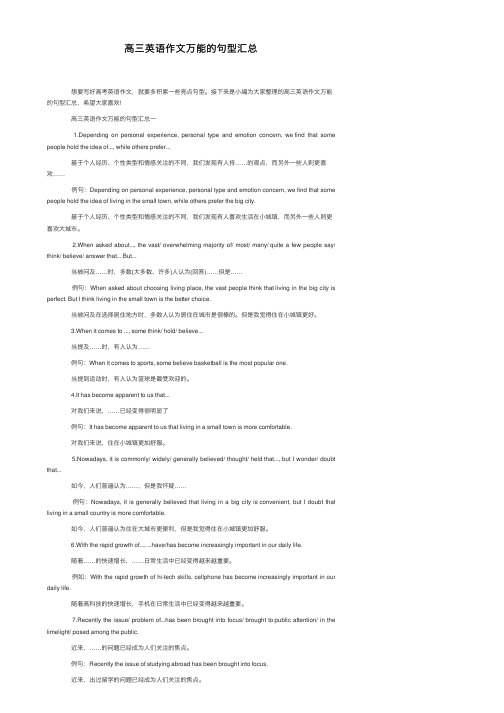
⾼三英语作⽂万能的句型汇总 想要写好⾼考英语作⽂,就要多积累⼀些亮点句型。
接下来是⼩编为⼤家整理的⾼三英语作⽂万能的句型汇总,希望⼤家喜欢! ⾼三英语作⽂万能的句型汇总⼀ 1.Depending on personal experience, personal type and emotion concern, we find that some people hold the idea of..., while others prefer... 基于个⼈经历、个性类型和情感关注的不同,我们发现有⼈持……的观点,⽽另外⼀些⼈则更喜欢…… 例句:Depending on personal experience, personal type and emotion concern, we find that some people hold the idea of living in the small town, while others prefer the big city. 基于个⼈经历、个性类型和情感关注的不同,我们发现有⼈喜欢⽣活在⼩城镇,⽽另外⼀些⼈则更喜欢⼤城市。
2.When asked about..., the vast/ overwhelming majority of/ most/ many/ quite a few people say/ think/ believe/ answer that... But... 当被问及……时,多数(⼤多数、许多)⼈认为(回答)……但是…… 例句:When asked about choosing living place, the vast people think that living in the big city is perfect. But I think living in the small town is the better choice. 当被问及在选择居住地⽅时,多数⼈认为居住在城市是很棒的。
新高三英语语法知识点总结
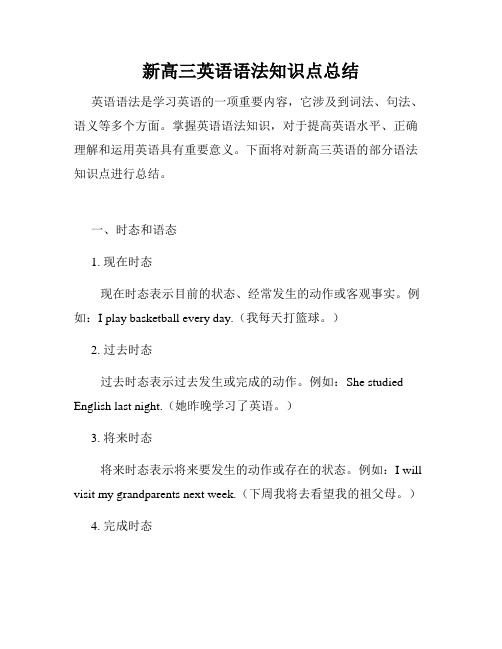
新高三英语语法知识点总结英语语法是学习英语的一项重要内容,它涉及到词法、句法、语义等多个方面。
掌握英语语法知识,对于提高英语水平、正确理解和运用英语具有重要意义。
下面将对新高三英语的部分语法知识点进行总结。
一、时态和语态1. 现在时态现在时态表示目前的状态、经常发生的动作或客观事实。
例如:I play basketball every day.(我每天打篮球。
)2. 过去时态过去时态表示过去发生或完成的动作。
例如:She studied English last night.(她昨晚学习了英语。
)3. 将来时态将来时态表示将来要发生的动作或存在的状态。
例如:I will visit my grandparents next week.(下周我将去看望我的祖父母。
)4. 完成时态完成时态表示过去发生的动作对现在产生的影响或结果。
例如:I have finished my homework.(我已经完成了我的作业。
)5. 进行时态进行时态表示正在进行的动作。
例如:They are playing football in the park.(他们正在公园踢足球。
)二、句型结构1. 主谓结构主谓结构是最基本的句子结构,主语是动作的执行者,谓语是动作的内容。
例如:She sings well.(她唱得很好。
)2. 主谓宾结构主谓宾结构是在主谓结构的基础上添加宾语,宾语是动作的承受者或影响者。
例如:He likes apples.(他喜欢苹果。
)3. 主谓表结构主谓表结构是在主谓结构的基础上添加表语,表语是对主语的补充说明。
例如:She is happy.(她很开心。
)4. 主系表结构主系表结构由主语、系动词和表语组成,系动词用于连接主语和表语。
例如:The flowers smell nice.(这些花闻起来很香。
)三、从句1. 名词性从句名词性从句可以在句子中起到名词的作用,常用作主语、宾语、表语等。
例如:What he said is true.(他说的是真的。
高三英语语法总复习——基本句型

注③:第一类可以改为由 to 引导的短语;第二类可以改为由 for 引导的短语; 引导的短语。 引导的短语。 间接宾语用介词词组表示的场合: 注④:间接宾语用介词词组表示的场合: a. 对间接宾语加以强调时: 对间接宾语加以强调时: I’ve bought it for you, not for myself. I’ll hand this letter to the secretary and not to the director. b. 当直接宾语是一个人称代词时: 当直接宾语是一个人称代词时: I’ll send it to you tomorrow. You’d better hand it directly to the headmaster. c. 当直接宾语比间接宾语短时: 当直接宾语比间接宾语短时: She showed the picture to the students sitting near her. d. 当间接宾语置于句首时: 当间接宾语置于句首时: Who did you send it to? To him I told the story, not to his brother. e. 当间接宾语和直接宾语都是代词时: 当间接宾语和直接宾语都是代词时: He gave it to me. I’ll lend them to you.
句子成分
一、主语 主语可以用下面这些东西表示: 主语可以用下面这些东西表示:
1. 名词;2. 代词; 3. 数词;4. 动名词;5. 不定式;6. 词组或复合 名词; 代词; 数词; 动名词; 不定式; 结构; 从句; 名词化的其他词类, 结构;7. 从句;8. 名词化的其他词类,如: A foreign language is a weapon in the struggle of life. Who is speaking, please? This is Jack speaking. Two will be enough. Living in that island country for three months was an unforgetable experience for me. Early to bed and early to rise makes a man healthy, happy and wise. Whether we’ll go depends on the weather. “A” is an article.
高三英语作文高级句型
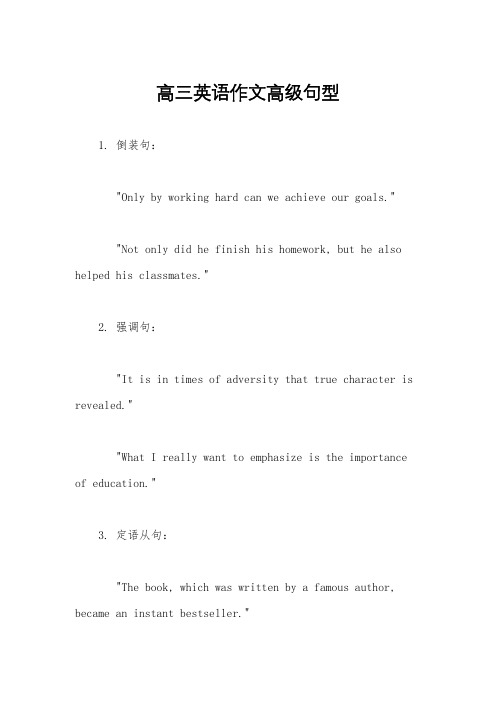
高三英语作文高级句型1. 倒装句:"Only by working hard can we achieve our goals.""Not only did he finish his homework, but he also helped his classmates."2. 强调句:"It is in times of adversity that true character is revealed.""What I really want to emphasize is the importance of education."3. 定语从句:"The book, which was written by a famous author, became an instant bestseller.""The person who works hard will eventually succeed."4. 状语从句:"Although it was raining heavily, they still decided to go for a picnic.""As the sun began to set, we realized it was time to head home."5. 虚拟语气:"If I were you, I would apologize.""I wish I had studied harder for the exam."6. 并列句:"He is not only intelligent, but also hardworking.""She enjoys playing the piano and painting."7. 复合句:"After finishing her work, she went for a walk in the park.""Since he had no money, he couldn't buy the tickets."8. 比喻:"His words were daggers, piercing through my heart.""Life is a journey, not a destination."以上这些句型可以帮助你提升作文的表达能力,使文章更具吸引力和说服力。
高三英语知识点归纳
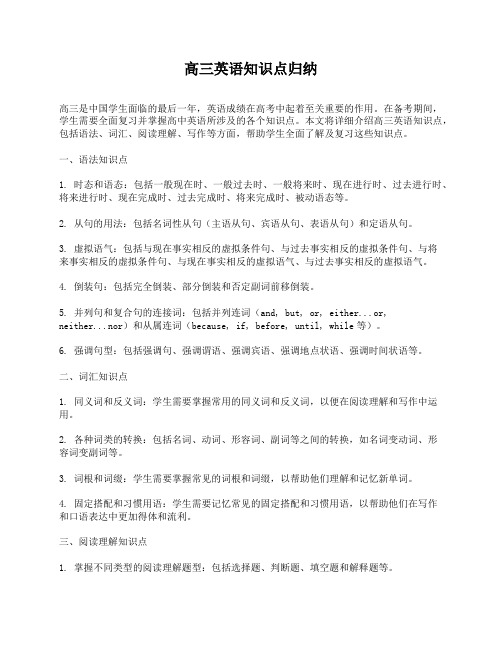
高三英语知识点归纳高三是中国学生面临的最后一年,英语成绩在高考中起着至关重要的作用。
在备考期间,学生需要全面复习并掌握高中英语所涉及的各个知识点。
本文将详细介绍高三英语知识点,包括语法、词汇、阅读理解、写作等方面,帮助学生全面了解及复习这些知识点。
一、语法知识点1. 时态和语态:包括一般现在时、一般过去时、一般将来时、现在进行时、过去进行时、将来进行时、现在完成时、过去完成时、将来完成时、被动语态等。
2. 从句的用法:包括名词性从句(主语从句、宾语从句、表语从句)和定语从句。
3. 虚拟语气:包括与现在事实相反的虚拟条件句、与过去事实相反的虚拟条件句、与将来事实相反的虚拟条件句、与现在事实相反的虚拟语气、与过去事实相反的虚拟语气。
4. 倒装句:包括完全倒装、部分倒装和否定副词前移倒装。
5. 并列句和复合句的连接词:包括并列连词(and, but, or, either...or, neither...nor)和从属连词(because, if, before, until, while等)。
6. 强调句型:包括强调句、强调谓语、强调宾语、强调地点状语、强调时间状语等。
二、词汇知识点1. 同义词和反义词:学生需要掌握常用的同义词和反义词,以便在阅读理解和写作中运用。
2. 各种词类的转换:包括名词、动词、形容词、副词等之间的转换,如名词变动词、形容词变副词等。
3. 词根和词缀:学生需要掌握常见的词根和词缀,以帮助他们理解和记忆新单词。
4. 固定搭配和习惯用语:学生需要记忆常见的固定搭配和习惯用语,以帮助他们在写作和口语表达中更加得体和流利。
三、阅读理解知识点1. 掌握不同类型的阅读理解题型:包括选择题、判断题、填空题和解释题等。
2. 提高阅读理解技巧:学生需要学会快速浏览文章,提取关键信息,理解文章的结构和主题,推断作者的意图和观点。
3. 词汇理解:学生需要掌握常见的词汇,以便在阅读理解中理解和运用。
- 1、下载文档前请自行甄别文档内容的完整性,平台不提供额外的编辑、内容补充、找答案等附加服务。
- 2、"仅部分预览"的文档,不可在线预览部分如存在完整性等问题,可反馈申请退款(可完整预览的文档不适用该条件!)。
- 3、如文档侵犯您的权益,请联系客服反馈,我们会尽快为您处理(人工客服工作时间:9:00-18:30)。
高三英语重点句型总结1. It作先行主语和先行宾语的一些句型She had said what it was necessary to say.2.强调句型It is not who rules us that is important, but how he rules us.3. "All+抽象名词"或"抽象名词+itself"(very+形容词)He was all gentleness to her.4.利用词汇重复表示强调A crime is a crime a crime.5. "something(much)of"和"nothing(little)of" "something of"相当于"to some extent",表示程度。
在疑问句或条件从句中,则为"anything of ",可译为"有点","略微等。
""译为毫无","全无"。
"much of"译为"大有","not much of"可译为"算不上","称不上","little of"可译为"几乎无"。
something like译为"有点像,略似。
"They say that he had no university education, but he seems to be something of a scholar.6.同格名词修饰是指of前后的两个名词都指同一个人或物,"of"以及它前面的名词构一个形容词短语,以修饰"of"后面的那个名词。
如"her old sharper of a father",可译为:"她那骗子般的父亲"。
Those pigs of girls eat so much.7. as…as…can(may)beIt is as plain as plain can be.8. "It is in(with)…as in(with)"It is in life as in a journey.9. "as good as…"相等于,就像,几乎如;实际上,其实,实在。
The merchant as good as promised the orphan boy, that he would adopt him. 10."many as well…as"和"might as well …as" "many as well…as"可译为"与其……,不如……,更好","以这样做……为宜","如同……,也可以……"等等。
"might as well …as"表示不可能的事,可译为"犹如……","可与……一样荒唐","与其那样不如这样的好"等等。
One may as well not know a thing at all as know it imperfectly.11."to make…of"的译法(使……成为……,把……当作)I will make a scientist of my son.12. oo…+不定式",not(never)too…+不定式","too…not+不定式She is too angry to speak.13. only(not, all, but, never) too …to do so "和"too ready (apt) + to do"结构中,不定式也没有否定意义,凡是"not","all""but等字后+"too…to,"不定式都失去了否定意义,在"too ready(apt) +to do"结构中,不定式也没有否定意义。
You know but too yell to hold your tongue.14. "no more …than…"句型A home without love is no more a home than a body without a soul is a man. 15. "not so much…as"和"not so much as …"结构,"not so much…as"="not so much as …",其中as有进可换用but rather,可译为:"与其说是……毋须说是……"。
而"not so much as"="without(not)even,"可译为"甚至……还没有"。
The oceans do not so much divide the world as unite it .16. "Nothing is more…than"和"Nothing is so …as"结构,"Nothing is more…than"和"Nothing is so …as"都具有最高级比较的意思,"Nothing I"可换用"no","nobody","nowhere","little","few","hardly","scarcely"等等,可译为"没有……比……更为","像……再没有了","最……"等。
Nothing is more precious than time.17. "cannot…too…"结构,"cannot…too…"意为"It is impossible to overdo…"或者,即"无论怎样……也不算过分"。
"not"可换用"hardly","scarcely"等,"too"可换用"enough","sufficient"等You cannot be too careful.18. "否定+but "结构,在否定词后面的"but",具有"which not","who not","that not",等等否定意义,构成前后的双重否定。
可译成"没有……不是"或"……都……"等Nothing is so bad but it might have been worse.19. "否定+until (till)"结构,在否定词"no","not","never","little","few","seldom"等的后边所接用的"until/till",多数情况下译为"直到……才……","要……才……",把否定译为肯定。
Nobody knows what he can do till he has tried.20. "not so…but"和"not such a …but"结构,这两个结构和"否定+but"的结构差不多,不同之点是这两个结构中的"but"是含有"that…not"意味的连续词,表示程度。
可译为"还没有……到不能做……的程度","并不是……不……","无论怎样……也不是不能……"等。
He is not so sick but he can come to school.21. "疑问词+should…but "结构,这个结构表示过去的意外的事,意为"none…but",可译为"除了……还有谁会……","岂料","想不到……竟是……"等。
Who should write it but himself?22. "who knows but (that)…"和"who could should…but"结构,这个结构是反问形式,一般意译为"多半","亦未可知"等等,有时也可直译。
Who knows but (that) he may go?23. "祈使句+and"和"祈使句+or"结构,"祈使句+and"表示"If…you…","祈使名+or"表示"if…not…,you。
Add love to a house and you have a home. Aad righteousness to a city and you have a community. Aad truth to a pile of red brick and you have a school.24. "名词+and"结构,在这个结构中,名词等于状语从句,或表示条件,或表示时间。
